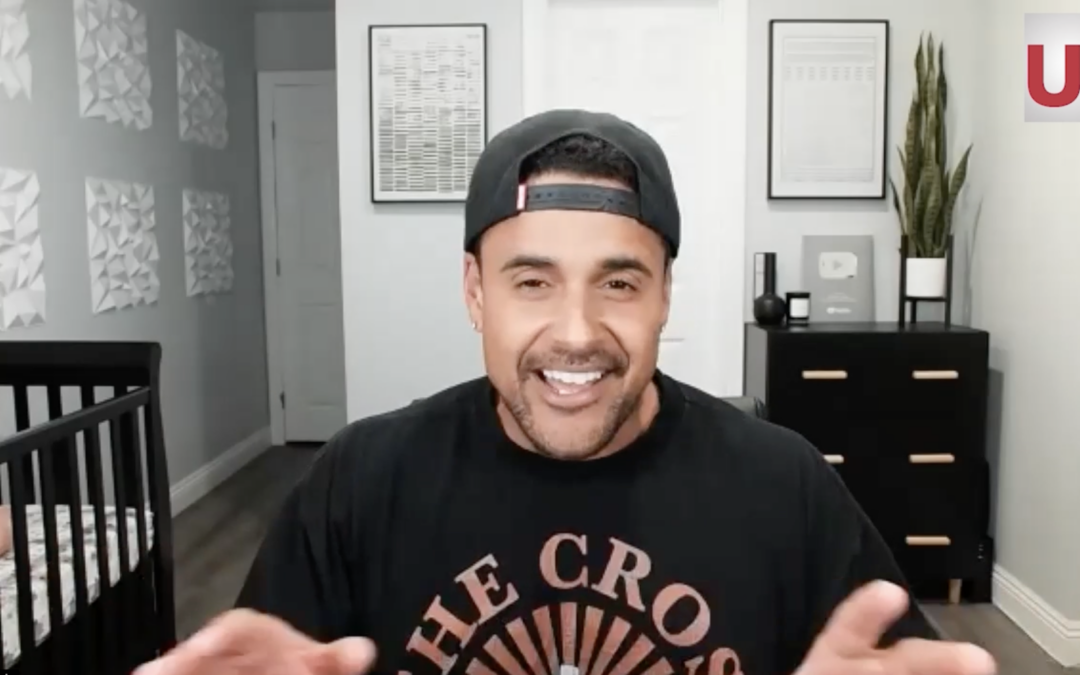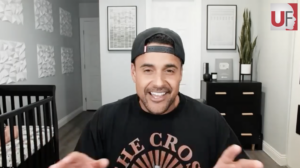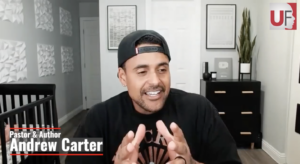
The Privilege of Prayer with Andrew Carter
Have you ever wanted to pray, but it felt like a chore? Have you ever been seeking God for direction but felt like you didn’t know if you could hear Him? Have you ever wanted to pray but simply didn’t know what to say? Pastor Andrew Carter has written the book for all of us on how refocus our prayer lives. The Privilege of Prayer: Find Healing, Transformation, and Answers, is Pastor Andrew’s guide on how to help us connect with God in ways many never thought possible. The full interview is above. Excerpts and more about Pastor Andrew are below.

UF: We are excited today to have another amazing author, minister, pastor, leader, pastor Andrew Carter, who is sharing with us and we’re talking about his book, The Privilege of Prayer: Find healing, Transformation, and Answers. Can you talk about why it’s important that you frame prayer not as a formula or a way to make something happen, but really focused in on prayer as a relationship with God?
Pastor Andrew: Yeah, absolutely. I believe that all of our relationships really trickle down from our relationship with God. And I talk about just that. If you struggle to communicate with God who loves you, right, even with all of your flaws and mistakes and blunders, if you struggle to talk to the greatest lover of your soul, what does that look like when you communicate to somebody who’s not going to love you like that, your spouse or a friend? If you struggle to spend time with God, like how hard is it going to be to spend time with other people in a way that is devoted and is intimate like you would with God?
UF:
You developed a discipline of prayer in jail amid a community and I think that’s so key that we have to be surrounded by people to help disciple us and raise us up in the faith. Can you talk a little bit about why that’s important and kind of your journey to being discipled in prayer?
Pastor Andrew:
Yeah, yeah, as far as the discipline aspect goes, I grew up unruly with a lot of instability, both of my parents were drug addicts and so what I found is that in chaos, I typically match my environment. I’m chaotic as well, but when there is a sense of consistency and discipline and stability, I thrive. And so, I understood early on when you discipline yourself consistently it always equals results and I found that out in the physical fitness realm before the spiritual realm. And so really, I just adapted what worked in the physical, applied it to the spiritual and watched my prayer life just take off.
UF: Can you talk about why it’s important to see prayer as an opportunity and an honor and a privilege instead of as an obligation?
Pastor Andrew:
I mean, if you ever try to put together any kind of a toy the day after Christmas or try to put together a cabinet from Ikea, any of those things, they all come with an instruction manual. And, you know, I know that men tend to be adventurous, and we think that we can put things together without the guide. But nine times out of ten, you’ve got extra pieces laying around. You don’t know where things are supposed to go. It’s probably not sturdy. It doesn’t look the way that the manufacturer had made it out to be. It’s important that we’re praying because that is a part of the design that God made for us, this communion, for this intimacy, for this communication. So, rather than looking at it like you said an obligation, like we have the privilege to go directly to the source of the instruction, not just the instruction manual, the writer of the manual one on one to get all the direction guidance, vision, happiness, peace, enjoy that we could ever imagine. It’s really a privilege.
UF:
Can you talk a little bit about how we can overcome some barriers that keep us from connecting and communicating with God in prayer?
Pastor Andrew:
Absolutely. I would say that most of the barriers that people experience come from a lack of knowledge or understanding of the enemy uses lies to try to prevent you or stall you from entering that relationship. They’ll say “did he really say that” or you can’t hear his voice or he’s not listening and we allow these barriers to come between us and God and so one of the things that I preach all day and I’m not trying to be too preachy but like, you can’t say that God’s not talking to you if your Bible is closed, right? You can’t say that he’s not talking to you when he speaks primarily through the Word. And so many people are trying to hear God’s voice but they’re so attuned to what the world says and they got the world turned all the way up they got His voice turned all the way down. Many times, they’re not barriers at all, they’re what we perceive as barriers, but it’s many times just us not understanding who we are, based on what the scripture tells us.
UF:
Second to last question I have you a lot of the folks who are listening and hearing and engaging with us they’re young adults, and they’re trying to figure out how do I ground myself?
Pastor Andrew:
Yeah, I love that question because I work with young adults, myself here in Los Angeles and one of the things that I see about young adults right now are probably some of the most spiritual and connected individuals that I’ve met. I’m surrounded by [people in their 20s], and they are so spiritual they’re so in alignment with the voice of God, like there is an anointing on this net I get goosebumps talking about it there’s there there’s an anointing on this next generation. One of the things that they lack is consistency and discipline. They’re up until two three in the morning, doing God things right. They’re at prayer meetings and they’re doing all of these amazing things for the Lord, but they can’t even keep a regular job because they’re just following the Spirit wherever the Spirit goes and I think that a lot of them are missing that solid practical discipline and consistency because it’s not one or the other it’s both and right you need to have that that kind of spiritual, you know, alignment with the Lord but it also needs to be in a way that is discipline and consistent and has order so if I were to say one thing I would say, get yourself around a man or woman of God, who has gone before you who exemplifies the discipline and consistency. Mentorship is probably one of the most important things that I’ve done. I have leaders and mentors and accountability partners and overseers in my life who I check in with every week, to check my blind spots, and it has helped me grounded. So, in the same way young adults, don’t be afraid reach out and get yourself some good solid mentors and individuals who will disciple you.
UF:
What is the piece of advice that you would give to folks who are trying to deepen their prayer lives so what what’s the number one thing you would tell them as they go to get your book for more.
Pastor Andrew:
To be to just show up. I think that that’s one of the hardest things to do I was in the fitness industry for a long time I owned a gym, and one of the hardest things that people struggle with is just showing up like once they get there. You know, they’re able to go through the motions but getting there is many times the battle, so the same with prayer sometimes. The words come, Holy Spirit will intercede, we know Jesus intercedes on our behalf. God will speak to us, but many times it’s just getting there. So, I would encourage people to carve out some time, set an alarm, turn everything off and just show up, and you’ll be surprised what God does in those spaces that we create and allow. He’s not always looking for ability. He’s looking for availability, and I’m a testament to that, because I am probably the least qualified to write a book, I’m probably the least deserving. There are guys who are way smarter, better communicators, more articulate, have spent more time in the Word. But the one thing that I’ve done is I made myself available and because of that availability, He’s overlooked my ability and he’s made sure that I’ve been fully prepared and equipped for every situation not by my strength, but by His. It starts with showing up

Andrew is the founder and lead pastor of Royal City Church in Los Angeles, California. He runs a popular live YouTube Bible study called ‘Coffee and Prayer’ that streams on all major podcast platforms. He appears on television networks, podcasts and stages preaching the good news of Jesus. Andrew travels the world guest speaking at conferences, churches, and events.
Andrew has become an inspiration for others who face difficult times and struggles. With millions of followers, Andrew has become an influencer for God’s Kingdom. He is a leader, speaker, writer, husband and father. Andrew and his wife, Kyra, live in Los Angeles, California. You can find Andrew on all social media platforms @andrewfcarter


 @rachelnoerd
@rachelnoerd 
